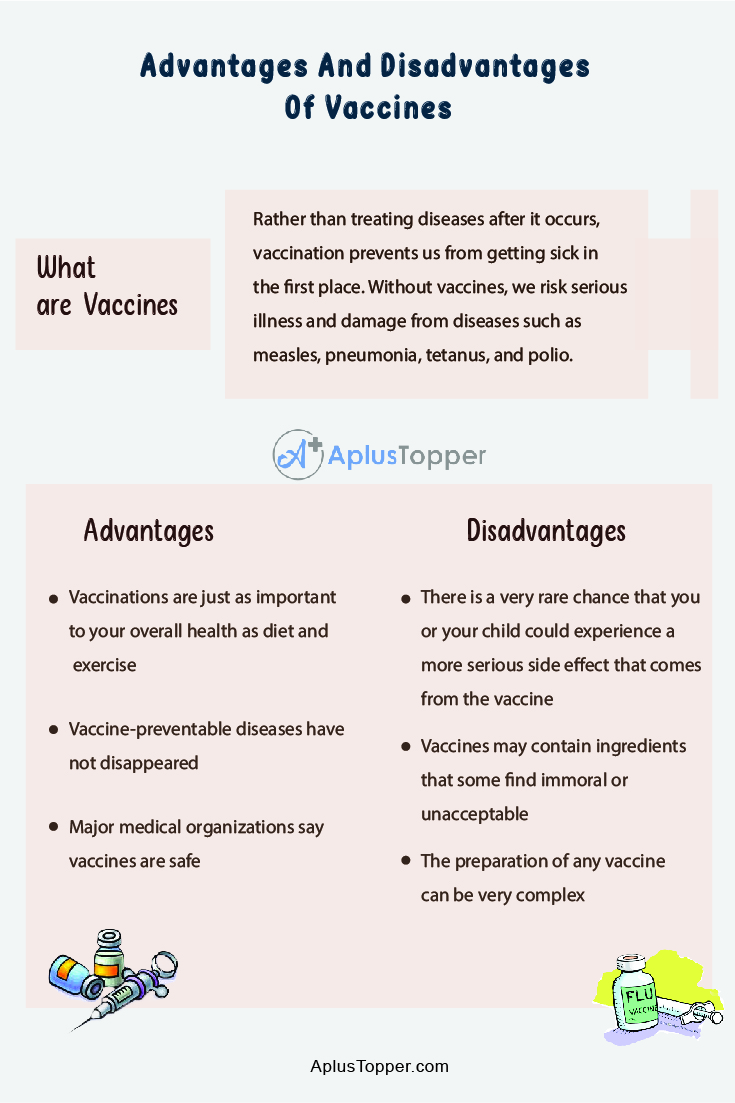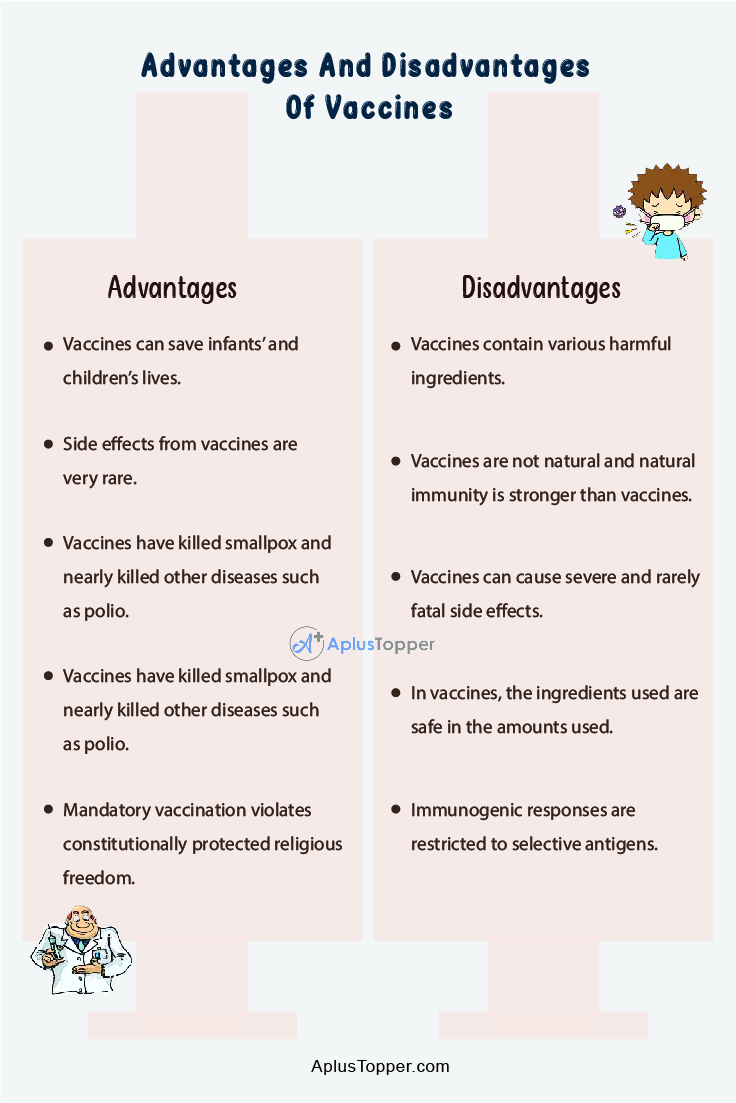Advantages And Disadvantages Of Vaccines: An effective way to prevent diseases before they affect you is to get vaccinated. It’s easy, safe, and convenient. Vaccines train your immune system by working with your body’s natural defenses to build protection against microbes such as viruses or bacteria by producing antibodies that are naturally produced by the immune system to fight diseases. Our immune system is designed to remember. After being exposed to one or more doses of the vaccine, we usually remain protected from the diseases for years, decades, or even a lifetime. Therefore, vaccines are extremely effective.
Students can also find more Advantages and Disadvantages articles on events, persons, sports, technology, and many more.
What are Vaccines? Advantages and Disadvantages of Vaccines 2022
Rather than treating diseases after it occurs, vaccination prevents us from getting sick in the first place. Without vaccines, we risk serious illness and damage from diseases such as measles, pneumonia, tetanus, and polio. Many diseases can be life-threatening. WHO estimates that childhood vaccines alone save more than 4 million lives each year.
Our world’s recent encounter with coronavirus has shown us the importance of vaccination. Coronavirus-related deaths have significantly decreased in the third wave, compared with the first wave. These improvements were made possible by vaccination campaigns conducted worldwide.
- Advantages of Vaccines
- Disadvantages of Vaccines
- Comparison Table for Advantages And Disadvantages Of Vaccines
- FAQ’s on Advantages And Disadvantages Of Vaccines
Advantages of Vaccines
- Vaccinations are just as important to your overall health as diet and exercise:- Like healthy eating, exercise, and regular check-ups, immunizations play an important role in keeping you healthy. Vaccination is one of the most convenient and safest preventive measures available.
- Vaccine-preventable diseases have not disappeared:- Viruses and bacteria that cause illness and death are still present and can be passed on to those who are not protected by vaccines. Although many diseases are not common in a particular country, global travel facilitates the spread of disease.
- Major medical organizations say vaccines are safe:- Major medical organizations such as WHO confirms that vaccines are some of the safest medical devices available. The potential side effects of vaccines are rare and far more serious than the diseases they prevent.
- The chances of becoming seriously ill or dying from the disease can be much higher than the chances of experiencing serious side effects:- Illness not only has a direct impact on individuals and their families but also has a high cost to society as a whole, exceeding $10 billion per year. Vaccines cost less time and money than infectious diseases Time without work caring for sick children, potential care for long-term disability, and medical costs.
- Vaccines protect the herd:- Vaccines not only protect individuals, but they also stop the spread of disease among the people around you and offer their protection to society as a whole. By preparing your body to deal with certain infections, the infectious disease time is significantly reduced, effectively stopping the spread of invading bacteria or viruses. The protection offered by group vaccination of people is called herd or (less flattering) herd immunity.

Disadvantages of Vaccines
- There is a very rare chance that you or your child could experience a more serious side effect that comes from the vaccine:- With all vaccines, about 1 in 1 million children are at risk for a life-threatening allergic reaction (anaphylaxis).
- Vaccines contain harmful ingredients:- Different vaccines have different compositions, which in some cases can be dangerous. For example, aluminum is used in some vaccines, and excess aluminum in the human body can cause nerve damage. Again, the chance of this happening is extremely rare.
- Even though vaccines help us a lot in fighting deadly diseases it does not provide a 100% guarantee:- The vaccine should only be given under the supervision of a healthcare professional. Vaccination is not recommended for people with weakened immune systems
- Vaccines may contain ingredients that some find immoral or unacceptable:- Mandatory vaccination violates constitutionally protected religious freedom. The Church of Illumination states that “Church teaching emphatically affirms that immunizations and vaccinations are against this biblical teaching.” Immunizations and vaccinations are forms of blood pollution because they have a devastating effect on desired regeneration.” Some also believe that the use of vaccines made using the cells of aborted fetuses demonstrates that “there is a serious responsibility to use alternative vaccines” to avoid the “crimes” of actively or passively participating in anything done voluntarily related to abortion.
- The preparation of any vaccine can be very complex:- It takes a lot of manual and intellectual resources of various scientists, funding, and economic resources from different organizations for the research and development of a particular vaccine. Also, it takes time to perfect a vaccine.
Comparison Table for Advantages And Disadvantages Of Vaccines
| Advantages | Disadvantages |
| Vaccines can save infants’ and children’s lives. | Vaccines contain various harmful ingredients. |
| Side effects from vaccines are very rare. | Vaccines are not natural and natural immunity is stronger than vaccines. |
| Vaccines have killed smallpox and nearly killed other diseases such as polio. | Vaccines can cause severe and rarely fatal side effects. |
| Vaccines are cost-effective compared to the cost of treating a disease. | In vaccines, the ingredients used are safe in the amounts used. |
| Mandatory vaccination violates constitutionally protected religious freedom. | Immunogenic responses are restricted to selective antigens. |

FAQ’s on Advantages And Disadvantages Of Vaccines
Question 1.
Are vaccines safe?
Answer:
All vaccines are thoroughly tested to ensure they do not harm you or your child. It often takes years for a vaccine to pass the necessary studies and tests for approval.
Question 2.
Will the immune system weaken if we rely on vaccines?
Answer:
No, the immune system produces antibodies against microbes such as the chickenpox virus, either naturally exposed or exposed through vaccines. The immune response to one disease is not weakened by the vaccination for another.
Question 3.
Why should healthy children be vaccinated?
Answer:
Vaccinations are designed to help keep children healthy. Because vaccines protect the body before illness occurs, if you wait until your child is sick, it’s too late for the vaccine. The best time to vaccinate children is when they are healthy.
Question 4.
What’s in a vaccine?
Answer:
Most people don’t care about the ingredients in vaccines and know that they are safe. The main ingredient of any vaccine is a small number of bacteria, viruses, or poison that has been previously weakened or destroyed in the laboratory. This means there is no risk for healthy people to be vaccinated. For this reason, you may see vaccines called “live” or “dead” vaccines.
Question 5.
Who cannot have vaccines?
Answer:
There are very few people who cannot be vaccinated. In general, vaccination is not only suitable for:
- People who have had a severe allergic reaction (anaphylaxis) to a previous dose of the vaccine.
- People who have had a severe allergic reaction to the ingredients in the vaccine. People with weakened immune systems (for example, because of cancer treatment or health) may also not be able to receive some vaccines.
- If you are unsure whether you or your child can be vaccinated, talk to your GP, nurse, healthcare provider, or pharmacist.
